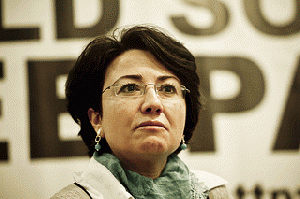Reprinted from Jonathan Cook Website
The disqualification of Haneen Zoabi highlights the difficulties the new political bloc faces maintaining cohesion after polling day
A new coalition of Arab parties running in next month's Israeli general election faced its first serious test on Thursday when one of its most prominent members was disqualified.
Haneen Zoabi, a member of the Israeli parliament since 2009, was barred from the campaign by the Central Elections Committee, a highly partisan body dominated by the major Israeli political parties.
As expected, the right-wing parties of prime minister Binyamin Netanyahu and foreign minister Avigdor Lieberman petitioned for her disqualification, accusing her of making statements in support of armed struggle.
But, more surprisingly, they were supported by the Zionist Camp, which has positioned itself as a centre-left alternative to the Netanyahu government. It is currently the second most popular party after Netanyahu's.
The committee members ignored the advice of the country's attorney-general, Yehuda Weinstein, that there were no legal grounds for banning Zoabi from parliament, known as the Knesset.
Zoabi is one of 11 MPs representing the 1.5 million-strong Palestinian minority in Israel, who avoided expulsion when Israel was created in 1948 and today have Israeli citizenship.
Her disqualification is the culmination of a campaign by the right-wing parties that accuses the Arab MPs of being "terrorists" and "traitors" who have no place in parliament -- or in Israel.
One of Lieberman's campaign slogans is "Haneen to Jenin," suggesting she should be expelled to a Palestinian city in the occupied West Bank.
The coalition of Arab parties -- formed last month under the title the "Joint List" -- is will appeal to the supreme court next week to overturn the ban.
Fortunately for the list, the judges are likely to intervene on Zoabi's behalf. If they do not, the Arab coalition will face a crisis -- probably the first of a series over the coming weeks and months.
If Zoabi is excluded, the other parties in the list will have to decide whether to refuse to run in a show of solidarity. If, as seems more likely, they choose to ignore her disqualification and stand anyway, that could send a troubling message to their voters -- that Lieberman and Netanyahu get to decide who represents Palestinian citizens in the Israeli parliament.
An uncomfortable allianceThe list was established late last month after weeks of difficult negotiations as the Arab parties tried to set aside long-standing personality clashes and ideological disputes.
Traditionally, the parties have argued that their political differences -- representing nationalist, socialist and Islamic outlooks -- are important and needed to be preserved.
(Note: You can view every article as one long page if you sign up as an Advocate Member, or higher).






